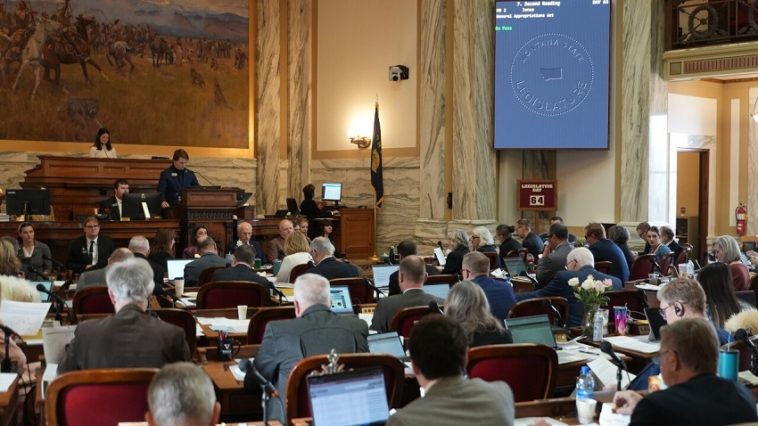Missoula, MT — The Montana House convened early Wednesday for a full day of debate, focusing on the state’s most critical piece of legislation: House Bill 2. This bill, which outlines the state’s budget for the next two years, proposes more than $16 billion in spending, touching nearly every aspect of state government.
The session marked a significant milestone in the legislative process, as lawmakers deliberated on HB 2 for nearly eight hours before ultimately giving it initial approval with a 60-39 vote. The vote reflected a blend of bipartisan support, with 36 Republicans and 24 Democrats backing the budget, while 21 Republicans and 18 Democrats opposed it.
Rep. Jerry Schillinger, R-Circle, set the tone for the day’s debate with a lighthearted remark: “Glad to be here, and hope everyone is ready for a riveting day of budget talks.” Despite the humor, the weight of the discussions was clear as lawmakers navigated a complex array of fiscal decisions that will impact the state for years to come.
Rep. Llew Jones, R-Conrad, chair of the House Appropriations Committee, led the presentation of HB 2. He acknowledged the challenges of creating a budget that meets the needs of all Montanans. “This budget, like all budgets, will be too large for some – I hear from them,” Jones said. “It’ll be too small for others – I hear from them. But I think it actually represents a pretty decent negotiated spot.”
Given the size and importance of HB 2, the budget is divided into five major sections: health and human services, education, natural resources and transportation, general government, and law and justice. Health and human services accounts for the largest portion, approximately 44% of the total budget. Each section was presented by subcommittee chairs, who explained notable changes and fielded amendments throughout the day.
One of the central points of contention during the debate was the issue of amendments. Jones urged fellow lawmakers not to introduce changes on the House floor, emphasizing that the budget’s size and the extensive subcommittee work already undertaken made floor amendments destabilizing. “We are dealing with a bill the size of a book, and making these changes on the floor makes this unstable,” he said.
However, Rep. Bill Mercer, R-Billings, disagreed with this cautionary approach, arguing that it was essential for lawmakers to debate and vote on the amendments in full view of the chamber. “You will be voting on each of these amendments, and you will be voting on this budget, and it will be your imprimatur saying that this is an appropriate budget,” Mercer remarked.
In the end, several amendments were approved. Notably, the House voted to remove $25 million allocated for a contingency fund that would have been managed by the governor’s budget office for employee recruitment and retention. The original plan had been to allow state agencies to request additional funds if they faced difficulties in attracting or retaining employees.
Additionally, the House added $1 million to fund seven new positions within Montana Fish, Wildlife, and Parks to support hunter education. Another $400,000 was earmarked for two new railroad inspector positions under the Montana Public Service Commission.
With the passage of HB 2’s initial approval, Montana lawmakers have set the stage for further debate as the budget continues its journey through the legislative process. While the measure has cleared a significant hurdle, further discussions and potential amendments are expected before it reaches its final form.
As the session moves forward, the challenge remains to balance the competing priorities of various sectors while ensuring that the state’s financial obligations are met in a responsible and sustainable manner. For now, lawmakers appear satisfied with the progress made, but the road ahead will undoubtedly involve more difficult decisions.



